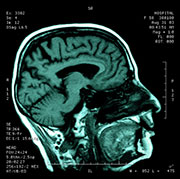- Most Homeless Americans Are Battling Mental Illness
- FDA Recalls Heart Failure Devices Linked to Injuries and Deaths
- COVID Does Not Spur Asthma in Kids, Study Finds
- Birth Control Pill Might Lower Odds for Sports Injuries
- Weight-loss Drug Zepbound Eases Sleep Apnea in Company Trials
- Mouse Study Shows Microplastics Migrating From Gut to Other Organs
- New Brain Target Key to Easing Tough-to-Treat Epilepsy
- Why Healthy Eating Is Key for Breast Cancer Survivors
- Placenta Plays Role in Gestational Diabetes, Study Suggests
- Some Gut Bugs May Help Lower Your Cholesterol
Gene Therapy Shows Early Promise Against Deadly Brain Cancer


Early trials of a new form of gene therapy may give hope to patients battling glioblastoma, the most deadly form of brain cancer.
Called AdV-Tk therapy, the new treatment involves two steps. As the researchers explained it, the first step involves taking DNA from the herpes virus and injecting it into tumor cells, and then attacking those DNA-tagged cells with a powerful drug.
In the second step, the drug helps spur the patient’s immune systems to eliminate more of the cancer cells over time.
All of the patients in the study had also undergone surgeries aimed at minimizing the tumor, the researchers noted.
The result, so far, has been a marked improvement in prognosis for the 48 patients participating in the preliminary trial.
“Glioblastoma is the most malignant brain tumor you can have,” said study co-author Dr. David Baskin, professor of neurosurgery with both Houston Methodist Hospital and the Weill-Cornell College of Medicine in New York City. “It’s almost always a death sentence, with median survival of about nine to 15 months, and the quality of life during the last five months is often quite poor.
“Surgery, along with chemotherapy and radiation, is the only current treatment option,” he added. “This cancer is like an octopus — it reaches into all parts of the brain [and] you can only ever get some of it out.”
However, “this particular gene therapy is better than anything else we have,” said Baskin, who also directs the Peak Brain Tumor Center at the Houston hospital. “By inserting a virus into the tumor, then attacking that virus with medication while also firing up the patient’s own immune system, you can get a real one-two punch treatment effect, and prolonged survival.”
He stressed that the treatment may not be a cure. “The [survival] numbers still stink,” Baskin said. “But they’re significantly better, which makes this a big advance.”
Baskin and his team are slated to present their findings Sunday in Chicago at the annual meeting of the American Society of Clinical Oncology.
The initial research spanned 2006 to 2010, when the investigators inserted harmless pieces of herpes simplex viral DNA into a cold virus. That modified virus was then injected directly into cancerous tissue. The researchers picked the cold virus because it’s known to spread widely and quickly in cells.
In the new clinical trial study, the 48 glioblastoma patients received the gene therapy after undergoing “aggressive” surgery aimed at reducing the tumor.
Each patient was then given an antiviral drug. The drug was designed to recognize and attack the inserted DNA fragment, and to “break open” any brain tumor cell into which the cold virus had spread.
The result, said Baskin, is that “suddenly the immune system starts killing anything that might have these proteins. So you put the Trojan horse virus in. Then, after you kill the virus the tumor cells explode, causing the immune system to hyper-activate without raising toxicity [to the patient].”
“It’s interesting and exciting, because the improvement [in survival] is significant,” Baskin said.
How significant?
Specifically, one-year survival rose from 57 percent to 67 percent; two-year survival rose from 22 percent to 35 percent; and the number of patients who lived at least three years rose from 8 percent to 19 percent, the study team found.
Overall, average survival improved by about eight months, researchers say.
“We’re not saying we have a cure, of course,” noted Baskin. “But we think we have something that makes a lot of sense conceptually, and is a real advance. And of course going forward we can try to get the numbers up even more by increasing the dose and finding additional targets. But even with what we have already, the improvement is big.”
Balveen Kaur is a professor of neurological surgery at Ohio State University in Columbus. She said that new approaches to fight brain tumors are sorely needed.
“All current FDA-approved therapies for brain cancer suffer from the drawback of having a lot of side effects, which limits their use and hence efficacy,” said Kaur, who is also the associate director of OSU’s Medical Center at the Comprehensive Cancer Center.
However, she cautioned that “while gene therapy has a lot of potential, it is important to keep in mind that the current study is a small study, with a few patients, and future randomized studies will be essential to identify if the treatment really works.”
Experts also note that findings presented at medical meetings are typically considered preliminary until published in a peer-reviewed journal.
More information
Find out more about glioblastomas at the American Brain Tumor Association.
Source: HealthDay
Copyright © 2024 HealthDay. All rights reserved.









